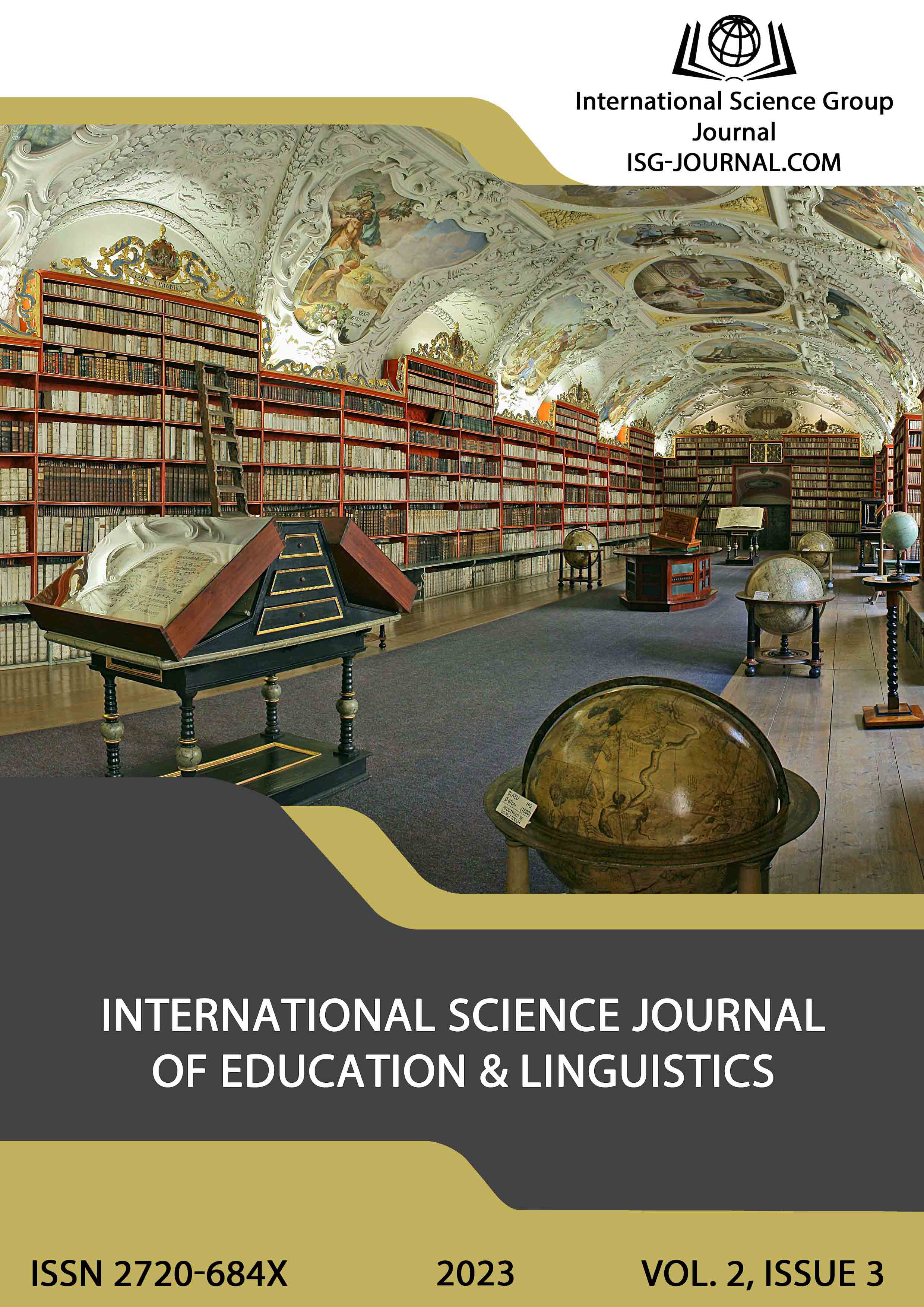Experience of conducting microcycles-trainings in continuous postgraduate education of anesthesiologists in the Research Institute of Medical and Biological Problems of the DSMU
DOI:
https://doi.org/10.46299/j.isjel.20230203.07Keywords:
anesthesiology, continuous professional improvement, master class,Abstract
The master class as a method is used in the post-graduate training of doctors, which has been held at the Research Institute of Medical and Biological Problems of the Dnipro State Medical University since 2008 for optional classes. Previously, leading domestic and foreign specialists were involved in providing classes. Nowadays, the need for this has disappeared, as our teachers have thoroughly mastered the necessary information and training methods and are currently able to work independently. Over the past 2 years, short-term cycles lasting up to 28 hours have been held at the Department of Anesthesiology, Intensive Care and Emergency Medicine of the Faculty of Postgraduate Education of the Dnipro State Medical University, which are included in the educational and production plan of the department and faculty. Step-by-step methodical training enables attending advanced training courses doctors to learn theoretical foundations and practical skills in the most productive way. The highest level of mastery of the material was determined among those specialists who were trained using the "master class" method. They also recorded the highest level of "retention" of theoretical knowledge and practical skills. The use of dummies and mannequins in the training process contributes to the kinesthetic consolidation of "hand memory", which makes it possible to bring manual skills to ensure high-quality protection of the respiratory tract to the level of automaticity. It was proved that the mastery of theoretical knowledge and practical skills when using the "master class" method was significantly higher than in the control group. Training participants with a certain involvement of the "master class" method in the educational process are given the opportunity to systematize and organize previously acquired manual skills and theoretical knowledge, as well as to consider the function of an anesthesiologist as a leading specialist in the perioperative period of patient treatment from a different angle. For young colleagues who have recently acquired specialization and interns of the second year of training, the use of such a technique provides the ability to adapt more quickly in a new team and conditions professional growth. A simulation approach to practical training allows participants to qualitatively master modern medical standards, which require the fastest possible professional decision-making and flawless execution of practical manipulations in extreme conditions.
References
Клигуненко О.М., Єхалов В.В., Площенко Ю.О. Лященко О.В., Скляр В.В. (2013) Роль та місце майстер-класу в навчанні лікарів-анестезіологів на курсах підвищення кваліфікації. Біль, знеболювання і інтенсивна терапія станів, 3, 5-8.
Єхалов В.В., Кравець О.В., Бараннік С.І., Пилипенко О.В., Сидоренко А.А. (2022) Мотивація успіху або невдачі у лікарів-інтернів за фахом "Анестезіологія та інтенсивна терапія". Новини медицини та фармації у світі, 1 (778), 16-17.
Запорожан В.М., Тарабрін О.О. (2018) Симуляційна медицина. Досвід. Здобуття. Перспективи. Практичний порадник. Суми : ПФ «Видавництво “Університетська книга”», 240.
Ramírez M.V. (2017) Training future anesthesiologists in obstetric care. Current Opinion in Anaesthesiology, 30, 3, 313-318. doi: 10.1097/ACO.0000000000000471
Волкова Н.П. (2009) Педагогіка: навч. посіб., 3-є видання. К. : Академвидав, 268-272.
6.Корда М.М., Шульгай А.Г., Запорожан С.Й., Гудима А.А., Крилюк В.О., Цимбалюк Г.Ю. (2019) Становлення та перспетиви розвитку симуляційної медицини в системі додипломної та післядипломної освіти. Симуляційне навчання в додипломній та післядипломній підготовці лікарів» : матеріали наук.-практ. конф. з міжнар. участю, 02-04 червня. 2019 р. Тернопіль : ТНМУ, 20-22.
Крилюк В.О., Цимбалюк Г.Ю., Кузьмінський І.В. (2019) Роль сертифікованих курсів в системі безперервної освіти медиків. Симуляційне навчання в додипломній та післядипломній підготовці лікарів» : матеріали наук.-практ. конф. з міжнар. участю, 02-04 червня. 2019 р. Тернопіль : ТНМУ, 23-24.
Okuda Y., Bond W.F., Bonfante G. McLaughlin S., Spillane L., Wang E., Vozenilek J., Gordon J.A. (2008) National growth in simulation training within emergency medicine residency programs, 2003-2008. Academic Emergency Medicine, 15, 1113-1116. doi: 10.1111/j.1553-2712.2008.00195.x
Наказ МОЗ України (2010) "Про заходи МОЗ України щодо удосконалення підготовки лікарів" від 03.12.2010 № 1074. Київ. doi: https://mozdocs.kiev.ua/view.php?id=11859
Артьоменко В.В., Носенко В.М., Берлінська Л.І. (2016) Симуляційні тренінги для анестезіологів при невідкладних станах в акушерстві та гінекології. Вісник Вінницького національного медичного університету, 1, 1 (20), 102 -104. doi: http://nbuv.gov.ua/UJRN/ vvnmu_2016_ 20_1%281%29__28
Петренко Н.В., Пасяка Н.В., Галіяш Н.Б., Бількевич Н.А. (2019) Важливість симуляційного навчання для формування та оволодіння фаховими компетентностями майбутніх медичних працівників. Симуляційне навчання в додипломній та післядипломній підготовці лікарів» : матеріали наук.-практ. конф. з міжнар. участю, 02-04 червня. 2019 р. Тернопіль : ТНМУ, 24-25.
Клигуненко О.М., Єхалов В.В., Станін Д.М., Кравець О. В., Сорокіна О.Ю. (2008) Переваги використання методики «майстер-класу» на курсах підвищення кваліфікації лікарів-анестезіологів. Збірник наукових праць співробітників НМАПО імені П.Л. Шупика. Випуск 17. Книга 1. Київ, 86-90.
Наказ МОЗ України (2006) № 430 від 03.07.2006 р. Клінічний протокол «Про затвердження протоколів надання медичної допомоги за спеціальністю "Анестезіологія та інтенсивна терапія"». Київ. doi: https://zakon.rada.gov.ua/rada/show/v0430282-06#Text
Артеменко В.В., Носенко В.М., Вастьянов Р.С., Берлинская Л.И., Новиков Д.А., Семченко С.С., Егоренко О. С. (2015) Симуляционное обучение при лечении неотложных состояний. Досягнення біології та медицини, 2 (26), 58-64.
Bisgaard C.H., Rodt S.A., Musaeus P., Petersen J.A.K., Rubak S.L.M. (2021) Early procedural training increases anesthesiology residents’ clinical production: a comparative pre-post study of the payoff in clinical training. BMC Medical Education, 21, 262, 1-9. doi: https://doi.org/10.1186/s12909-021-02693-w
Downloads
Published
How to Cite
Issue
Section
License
Copyright (c) 2023 Василь Віталійович Єхалов, Ольга Вікторівна Кравець, Вячеслав Вячеславович Горбунцов

This work is licensed under a Creative Commons Attribution 4.0 International License.





